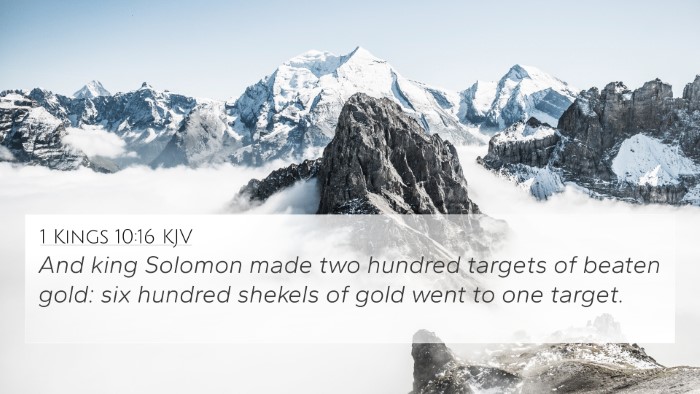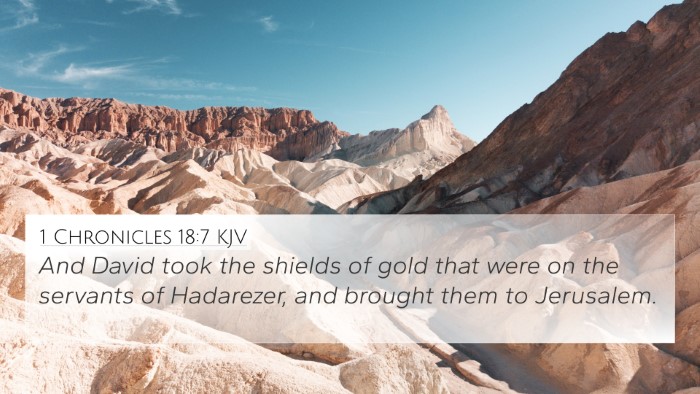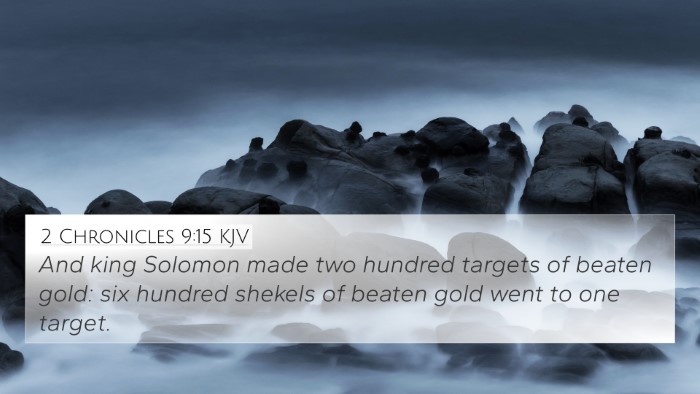Old Testament
Genesis Exodus Leviticus Numbers Deuteronomy Joshua Judges Ruth 1 Samuel 2 Samuel 1 Kings 2 Kings 1 Chronicles 2 Chronicles Ezra Nehemiah Esther Job Psalms Proverbs Ecclesiastes Song of Solomon Isaiah Jeremiah Lamentations Ezekiel Daniel Hosea Joel Amos Obadiah Jonah Micah Nahum Habakkuk Zephaniah Haggai Zechariah Malachi2 Samuel 8:7 Similar Verses
2 Samuel 8:7 Cross References
And David took the shields of gold that were on the servants of Hadadezer, and brought them to Jerusalem.
Uncover the Rich Themes and Topics of This Bible Verse
Listed below are the Bible themes associated with 2 Samuel 8:7. We invite you to explore each theme to gain deeper insights into the Scriptures.
2 Samuel 8:7 Cross Reference Verses
This section features a detailed cross-reference designed to enrich your understanding of the Scriptures. Below, you will find carefully selected verses that echo the themes and teachings related to 2 Samuel 8:7 KJV. Click on any image to explore detailed analyses of related Bible verses and uncover deeper theological insights.

1 Kings 14:26 (KJV) »
And he took away the treasures of the house of the LORD, and the treasures of the king's house; he even took away all: and he took away all the shields of gold which Solomon had made.

1 Kings 10:16 (KJV) »
And king Solomon made two hundred targets of beaten gold: six hundred shekels of gold went to one target.

1 Chronicles 18:7 (KJV) »
And David took the shields of gold that were on the servants of Hadarezer, and brought them to Jerusalem.

2 Chronicles 9:15 (KJV) »
And king Solomon made two hundred targets of beaten gold: six hundred shekels of beaten gold went to one target.
2 Samuel 8:7 Verse Analysis and Similar Verses
Understanding 2 Samuel 8:7
Bible Verse: 2 Samuel 8:7 - "And David took the shields of gold that were on the servants of Hadadezer and brought them to Jerusalem."
This verse marks a significant moment in the reign of King David, where he showcases not only his military prowess but also demonstrates the divine favor upon him. Such themes echo through the Scriptures, interlinking with various Biblical texts and enhancing our understanding of David's kingship and God's covenant promise.
Significance of 2 Samuel 8:7
In this verse, David's action of taking the golden shields signifies a triumph over his enemies and a reflection of the wealth and successes that accompany a leader favored by God. The capture of such valuable items can be interpreted as David reaping the benefits of God’s providential care, emphasizing the theme of victory gifted by divine assistance.
Insights from Commentaries
- Matthew Henry: Henry notes the act as a symbol of David's might and the spoils of war, indicating the transfer of wealth from the enemy to God's chosen leader. He emphasizes that such victories are part of God’s plan for His people, strengthening the nation of Israel under David's reign.
- Albert Barnes: Barnes discusses the importance of the gold shields, identifying them as an element of military but also ornamentation, signifying the glory of the Israelite army. His commentary suggests that David not only secured military victory but also items that represented the splendor of God’s blessing on Israel.
- Adam Clarke: Clarke elaborates on the importance of the shields in ancient warfare, highlighting that bringing such items to Jerusalem reinforced David's role as a unifier of the nation and the reinstater of worship, with new material wealth dedicated to the temple services.
Cross-References of 2 Samuel 8:7
This verse can be connected with various other scriptures that contextualize David’s military achievements and the significance of such victories. Here are some notable cross-references:
- 1 Chronicles 18:7: "And David took the shields of gold that were on the servants of Hadadezer and brought them to Jerusalem." - This verse parallels with 2 Samuel 8:7, solidifying the event's historical accuracy and significance.
- Psalm 144:10: "It is he who gives victory to kings, who delivers his servant David from the deadly sword." - Highlighting the divine assistance in David's victories.
- 2 Samuel 5:20: "So David went to Baal-perazim and defeated them there. He said, 'As waters break out, the Lord has broken out against my enemies before me.'" - Reflects the nature of David’s victories as orchestrated by God.
- 1 Samuel 30:18-19: "David recovered everything the Amalekites had taken, including his two wives. Nothing was missing ... David brought everything back." - Illustrates how David consistently regained what was lost, showcasing God's favor upon him.
- 2 Samuel 8:1: "In the course of time, David defeated the Philistines and subdued them." - A direct lead-up to the context in which he later takes the shields.
- Deuteronomy 20:4: "For the Lord your God is the one who goes with you to fight for you against your enemies to give you victory." - Reinforces the theological basis of divine support in battles.
- Joshua 1:5: "No one will be able to stand against you all the days of your life. As I was with Moses, so I will be with you; I will never leave you nor forsake you." - Illustrates the continuous divine backing for God’s chosen leaders.
Thematic Connections
The themes encapsulated in 2 Samuel 8:7 connect with broader motifs in Scripture concerning God's covenantal promises, leadership authority, and divine interventions. Below are some thematic connections:
- Divine Support in Leadership: The notion that God supports those He anoints can be observed repeatedly throughout the Bible, especially in the lives of patriarchs and leaders.
- Victory through Divine Intervention: Across Israel's history, victories are often attributed to God's intervention, such as in the battles of Gideon and Joshua.
- Wealth Transitioning for God’s Glory: The movement of wealth from the enemy to the faithful serves as a recurring theme, showing how God can turn the tide for His purpose.
- The Role of Praise in Victory: David often wrote Psalms reflecting God’s goodness in battle, portraying a pattern of worship following military success.
Conclusion
2 Samuel 8:7 presents a snapshot of King David's reign marked by military success and divine favor. The verse encapsulates essential principles of faith, leadership, and God’s sovereign plans. By studying this verse and its related cross-references, believers can gain a deeper appreciation of how God's providence operates in the lives of His chosen leaders, as well as the transformative power of His blessings.
Resources for Further Study
For those keen on diving deeper into comparative Bible verse analysis and cross-referencing Biblical texts, various tools and resources are available:
- Bible Concordance: A helpful tool to find cross-references and biblical themes.
- Bible Cross-Reference Guide: Guides that provide insights into linking scriptures effectively.
- Cross-Reference Bible Study: A methodology for understanding scriptural interrelations.
- Bible Reference Resources: A host of biblical dictionaries and references available in various formats.


